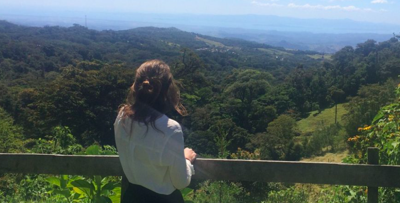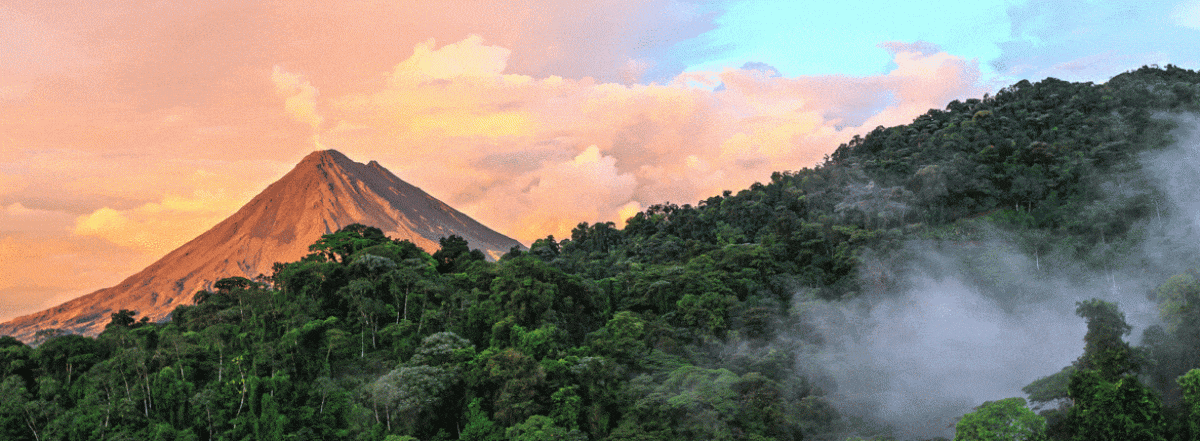Through immersive experience, students learn about Costa Rican health care
Jordan Corley | The Daily Collegian
Mar 13, 2019
https://www.collegian.psu.edu/news/campus/article_266f54f4-4514-11e9-bb65-839db8addea8.html
A student looks over the Costa Rican jungle during Penn State’s Exploring the Health Care System in Costa Rica program.

Courtesy of Celeste Newcomb
A woman and her husband were brought to tears as Penn State student Paula Tabaschek and her team presented a family in Costa Rica with a wheelchair to help the woman navigate her home after losing both of her legs due to severe diabetes.
This was one of the moments that Tabaschek (senior-biology) said made her realize how much she wanted to be there and impact the community.
“I was shocked by how health care can really impact the overall aspect of a community,” Tabaschek said.
Tabaschek traveled to Costa Rica through Penn State’s Exploring the Health Care System in Costa Rica program, which provides students with the opportunity to earn class credit and travel to Costa Rica while learning about the country’s health care system.
“The program provides a unique opportunity for students to examine some important topics, such as why people live longer in Costa Rica than the United States. How is it that they only spend 7 percent of their GDP on healthcare compared to the 17 percent we spend in the USA,” Celeste Newcomb, a professor in the Smeal College of Business and the College of Nursing said. Newcomb is the co-founder of the program.
The program is currently hosted by the College of Nursing; however, students of all majors and semesters are encouraged to apply. Students from branch campuses may apply, as well.
In total, students earn four credits for completing the Spring and May term courses and traveling to Costa Rica. After being accepted into the program in January, students attend five classes taught by Newcomb where they learn background information about Costa Rica’s health care system.
For the remainder of the semester, students work on their independent research project. Following the end of the spring semester, students depart for the one-week Costa Rica trip portion of the program.
While in Costa Rica, students observe EBAIS clinics. The term is translated in English to mean “Basic Teams of Global Health Care.” They are the first level of health care in Costa Rica.
Tabaschek, a teaching assistant for the course, explained that the country is broken up into multiple regions and within each region there is an area of health. Each EBAIS group is responsible for providing health care within their area of health.
Tabaschek said that within an EBAIS group there are doctors, nurses, secretaries, pharmacologists and ATAPs, which Tabaschek said are basically community health care workers who go from house to house administering vaccines, especially to those who can’t afford health care.
Throughout the duration of the trip, students followed ATAPs around on local home visits and observed their interactions with the community.
This year, there are 13 students traveling to Costa Rica. Those attending include three students from Commonwealth campuses, an adult learner from the World Campus program and nine University Park students representing the College of Nursing, the College of Health and Human Development and the College of Liberal Arts.
Upon completion of this program, Newcomb said multiple students have presented their research in the Penn State Undergraduate Exhibition. Many other students have joined the Peace Corps.
Here’s a look into the immersion experience of three Penn State students
Paula Tabaschek
During her junior year, Tabaschek took the class as a student and traveled to Costa Rica in May 2018.
Tabaschek said she heard about the program through the College of Health and Human Development.
She said she was interested in taking the class because she had been a part of Global Health Brigades and wanted to continue doing public health work.
A group poses during Penn State’s trip to Costa Rica as part of its Exploring the Health Care System in Costa Rica program.
Courtesy of Celeste Newcomb
Tabaschek said she was interested in attending graduate school and obtaining a Ph. D, and believed this opportunity would be a unique experience to discuss during interviews and place on her resume.
“It’s one of those things where you talk about it and it’s a very unique experience because you’re in country, observing patients and hospital care, not sitting in a classroom learning about it,” Tabaschek said.
On Tabaschek’s trip, she said her group followed an ATAP to a family living in a small hut and was able to observe his relationship with the family. Tabaschek said the ATAP walked into the family’s home and told the family he was there to give them vaccinations.
“[The family] was grateful because [they knew] the ATAP was coming to help them,” Tabaschek said.
Afterward, Tabaschek said they visited another house with a well-off family, and the ATAP followed the same protocol. She said she was surprised by this Costa Rican custom because the health care she is used to seeing in the United State is so different.
“This was a very immersive experience,” Tabaschek said, “because we were actually there in the house with the family and watching.”
She was inspired by the influence public health workers can have on the community’s mentality and the respect the community had for the health workers.
Moving forward in the public health field, Tabaschek said she hopes to apply the knowledge and experience she gained from the trip toward her career.
Tabaschek also presented her research project at the undergraduate symposium fair hosted by the Eberly College of Science and continued her research into the summer following her trip with Johns Hopkins University.
Maggie Lee
Maggie Lee participated in the program during her junior year and went to Costa Rica in the summer of 2018.
Lee (senior-nursing and Spanish) said she heard about the program from advertisements through the nursing school.
Lee said her previous study abroad experience was a cultural immersion experience which lasted six weeks. She said she was interested in this program because it was only one week and was health-care based, focusing specifically on the administration aspect of health care.
“In the class we talked about communicable diseases,” Lee said. “When we were in Costa Rica it was interesting to compare their universal health care system to the United States because it’s not universal.”
For her research project, Lee wrote a paper about vaccinations in Costa Rica, touching on subjects such as the policies surrounding a vaccination, the differences in the vaccination schedule compared to the United States, general public opinion and the recent measles outbreak.
While in Costa Rica, Lee said her group visited several hospitals and clinics and went on home visits with the ATAPs.
One of the biggest differences Lee said she noticed between health care in Costa Rica versus health care in the United States was the sense of community present in Costa Rica nursing versus the less personal medical treatment in the United States.
“[The program] allowed me to think about what the universal health care system is,” Lee said. “[I] had never really experienced it before and it made me realize how big an impact a universal health care system could have on the United States population.”
Steve Slaney
Steve Slaney, a Penn State graduate of the Class of 2014, traveled to Costa Rica as a student in the program during his fall 2014 semester and returned to Costa Rica two additional times as a translator with the program.
Slaney (graduate-health policy and administration) currently lives in Costa Rica while volunteering with the Peace Corps.
Slaney said he decided to apply for the program during his extra semester after changing his major halfway through his junior year.
A woman administers vaccines to a child in Costa Rica as part of Penn State’s Exploring the Health Care System in Costa Rica program.
Courtesy of Celeste Newcomb
As a student on the trip, Slaney said he appreciated the first-hand experience of learning how Costa Rica administers their health care.
“To me, experience is one of the most invaluable things,” Slaney said. “It’s priceless.”
Slaney’s research assignment was a report comparing the Costa Rican, Cuban and American health care systems. He said he researched the demographic variables beforehand and found it interesting to witness the cultural aspects in-person during the trip.
“My favorite moments were when we were in the more remote areas and we would go on visits to people’s houses,” Slaney said. “I thought that was really personal and interesting because for people who couldn’t get themselves to facilities, [local providers] came to them.”
Slaney’s group followed local health care providers on the job and observed as they interviewed different families, administered vaccinations and performed health check-ups on children and senior citizens.
Slaney said the community members were accustomed to seeing the health care providers and were gracious enough to let his group observe.
“It put us in an interesting situation because [we were] kind of invading someone else’s home,” Slaney said.
Slaney said the experience was very beneficial to him and opened his eyes up to different aspects of both health care and himself that he never would have known had he not traveled to a foreign country.
“To have an opportunity to do something like this under the umbrella of Penn State is just something that I would recommend to anyone,” Slaney said. “I think that whenever you can combine your academic life with some international exposure and experience, it will make you a better student and a better citizen.”
Minor corrections to article made on April 9, 2019


